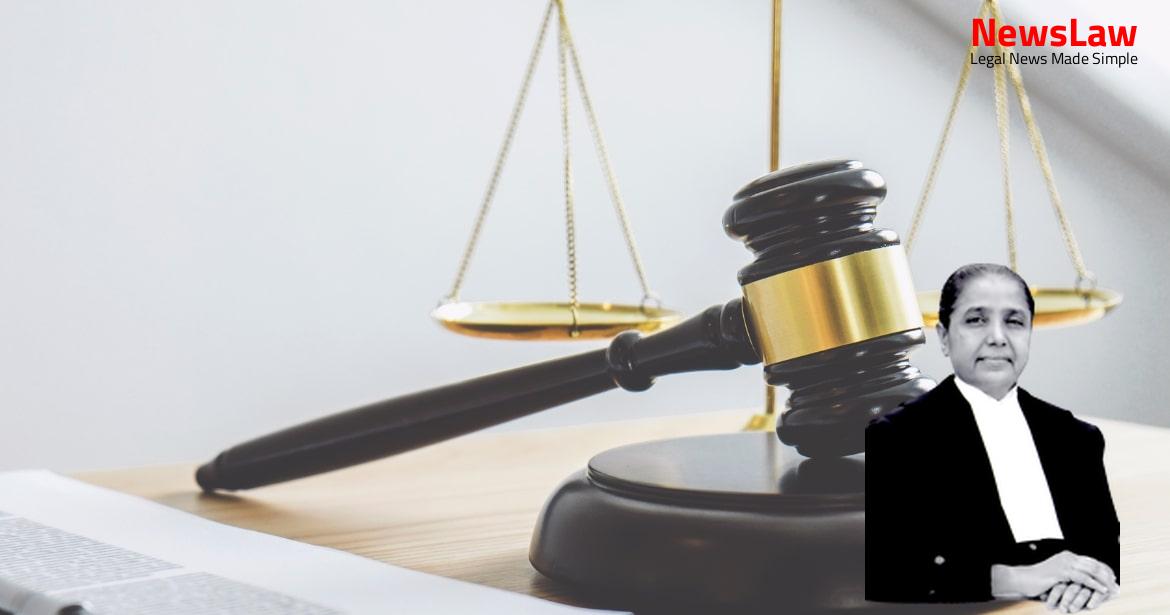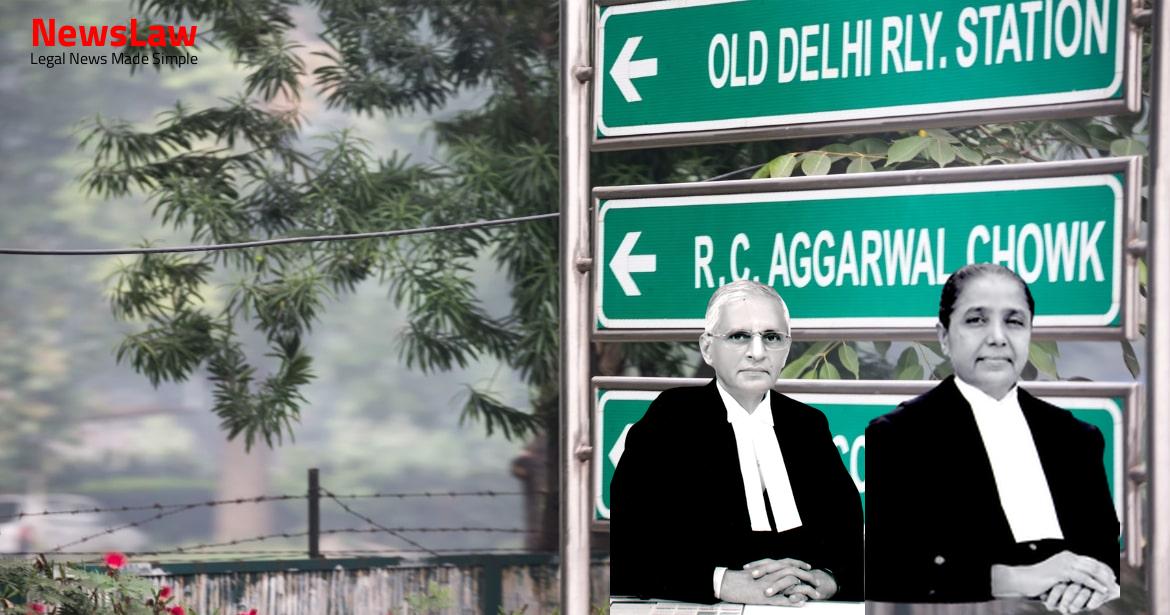In a significant legal case before the Supreme Court of India, the interpretation of Pension Rules was scrutinized in relation to the eligibility for invalid pension benefits. The case involved a dispute over the entitlement of invalid pension under Rule 39 of the Pension Rules for a deceased government employee. The ruling offers crucial insights into the application of pension regulations, impacting the provision of benefits for individuals like the late government servant in question.
Facts
- The applicant projected that her husband was found incapacitated and retired on 6.7.1996, passing away shortly after on 24.7.1996.
- She requested family pension from the date of her husband’s death on 24.7.1996.
- The applicant also sought invalid pension for her late husband.
- The appeal stemmed from a High Court judgment that upheld the Tribunal’s order directing consideration of invalid pension for the husband and subsequent settlement of family pension for the applicant.
- The applicant filed OA No 18(B)/2010 before the Tribunal for pay fixation and financial benefits for her late husband from 1.1.1996 until his retirement on 6.7.1996 due to incapacitation.
- The High Court dismissed the writ petition without considering the specific contention raised by the appellants.
- The court noted that the Tribunal had passed a reasoned order.
- It was observed that the husband of the respondent is entitled to an invalid pension under Rule 39 of the Pension Rules.
- Qualifying service of ten years for receipt of pension is required under Rule 47(2)(b).
- Alternate relief for government employees who retire before completing qualifying service is provided in the Pension Rules.
- The computation of service gratuity is also addressed in the Pension Rules.
Issue
- The issue to be considered is whether the minimum qualifying service prescribed under the Pension Rules can be ignored for the purpose of consideration of invalid pension under Rule 39 of the Pension Rules.
- The Tribunal and the High Court directed invalid pension for a government employee without the qualifying service as per the Pension Rules.
- Since the government servant died shortly after retirement, he was to be paid invalid pension under Rule 39, with the widow entitled to family pension after his death.
Also Read: Avitel Post Studioz Ltd. v. HSBC: Enforcement of Foreign Arbitral Award
Arguments
- The Government Advocate on behalf of the State contended that the applicant’s husband did not have the qualifying period of service for pension.
- The appellants argued that Rule 39 of the Pension Rules should be read together with Rule 47, which specifies ten years of qualifying service for a pension, making the applicant ineligible for relief from the Tribunal.
- Despite the State’s arguments, the Tribunal ruled in favor of the applicant’s husband, granting him invalid pension under Rule 39 of the Pension Rules.
- The Tribunal directed the authorities to sanction the invalid pension for the deceased husband and settle family pension for the applicant after regularization of the deceased employee’s services.
- In response, the appellants challenged the Tribunal’s decision through a writ petition, stating that when Rules 39 and 47 are read together, the deceased employee is ineligible for invalid pension.
- The High Court, without addressing the appellants’ specific argument, upheld the Tribunal’s decision based on the reasoned order declaring entitlement to invalid pension.
- The respondent’s husband was allowed to retire on 6.7.1996 due to mental incapacity.
- The respondent argues for granting invalid pension under Rule 39 of the Pension Rules for prematurely retiring employees with permanent incapacity.
- The Tribunal and High Court have approved the grant of invalid pension for the respondent’s husband.
- The State argues that the deceased employee’s unauthorized absence and suspension periods cannot be counted towards qualifying service.
- The deceased employee had a net qualifying service of 4 years 6 months and 29 days until his superannuation on 6.7.1996.
Also Read: Insurance Claim Repudiation due to Fire Incident: Court’s Legal Analysis
Analysis
- Invalid pension may be granted as per specific provisions.
- Family pension is provided for the family of a deceased Government servant under certain circumstances.
- Service gratuity is paid at a uniform rate based on completed six monthly periods of service.
- Family pension is granted if a Government servant retires due to bodily or mental incapacity.
- Specific medical authorities need to provide a certificate of incapacity for those applying for an invalid pension.
- The amount of pension is determined based on different factors such as qualifying service and retirement circumstances.
- The case pertains to the entitlement of invalid pension for late Sagar Naik, who did not have the required 10 years of qualifying service for regular pension.
- The Tribunal and High Court granted invalid pension and family pension to the widow despite the lack of qualifying service.
- The Pension Rules clearly state that 10 years of qualifying service is necessary for any type of pension benefits.
- Late Sagar Naik received gratuity and other terminal benefits, as well as a compassionate appointment for his widow, without any claim for invalid pension during his service.
- The rules for gratuity and pension are interconnected, with qualifying service of 10 years being essential for pension benefits.
- The High Court’s decision to grant invalid pension without the required qualifying service was not in line with the Pension Rules.
- Inconsistencies in the application of the Pension Rules were highlighted, emphasizing the need for a harmonious interpretation of the rules.
- The State argued for the necessity of satisfying qualifying service criteria for all types of pension benefits, including invalid pension.
- The judgement reiterated the importance of understanding the Pension Rules in their entirety, without isolating specific provisions.
- Compassion and adherence to established norms were considered crucial in cases like these.
- Justice A.K. Mathur, in a two judge Bench, interpreted provisions in the applicable Rules regarding qualifying service for invalid pension.
- The High Court’s view was negated by Justice A.K. Mathur’s interpretation.
- This interpretation was further supported by the case of Union of India and Another Vs. Bashirbhai R. Khiliji.
- In the mentioned case, the Court considered the claim for invalid pension for an armed constable in the CRPF who suffered from pyrogenic meningitis and neurosensory deafness.
- The requirement of qualifying service is crucial for claiming different service benefits under the same Rules.
- The employee in this case did not satisfy the requirement of qualifying service.
- Therefore, the invalid pension could not have been ordered for him under Rule 39 of the Pension Rules.
- Even though the respondent did not pray for invalid pension in her O.A., the Tribunal and High Court granted it to her.
Decision
- The additional relief provided to the family of the deceased was deemed unwarranted.
- The job provided under the Rehabilitation Assistance Scheme was considered sufficient for the sustenance of the deceased’s family.
- The impugned order was set aside as it was deemed unnecessary.
- The appeal was allowed and the parties were directed to bear their own costs.
Case Title: THE STATE OF ODISHA Vs. MANJU NAIK
Case Number: C.A. No.-009204-009204 / 2019



